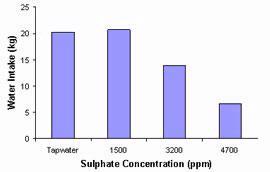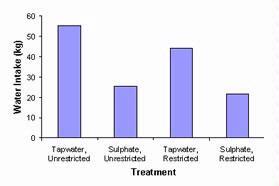Water forms the largest component of an animal’s body and is an essential nutrient required for all biological functions including temperature regulation, digestion, fetal development, and milk production. Dairy cattle require an adequate supply of fresh water – from 75 to over 100 L per day. We know that water consumption is closely tied to feed dry-matter intake and that milk production is dependent upon access to large volumes of water. Thus, if water intake declines due to restricted access or inferior quality, both feed consumption and milk production can be negatively impacted.
It is well established that water quality is one of the most important factors affecting water intake which in turn can affect herd health and milk production. There are two further aspects to consider regarding water quality: what causes water quality to decline, and what happens when cows only have access to poor quality water?
Water quality is reduced when it contains either biological or inorganic contaminants. One of the main biological contaminants found in water available to dairy cows is manure. Manure may contain pathogenic bacteria and when it contaminates drinking water disease can easily spread between animals drinking from the same trough. Inorganic contaminants such as sulphates, which occur naturally in many water sources, also decrease water quality and can lead to nutritional disorders.
Previous research has shown that cattle do not like “bad smelling” water and, not surprisingly, find it unpalatable. We also know that they can learn to associate illness with water flavour. Once cattle establish this link it has been shown that they will actually refuse to continue drinking the water.
Water quality is an issue that affects both the beef and dairy industries. All cattle are sensitive to decreasing water quality whether it is through biological or inorganic contamination. Our research was conducted using beef heifers and steers but the findings apply equally to dairy cattle. We conducted several trials to examine the effect of contaminated water on intake and drinking behaviour of cattle.
Our research has shown that cattle respond to decreases in quality by changing their drinking behaviour and reducing their water consumption. In particular, cattle given water containing sulphate compounds such as sodium sulphate and magnesium sulphate found it unpalatable and reacted to their presence in water by changing their drinking patterns, drinking more often at night when compared to the animals that had access to good quality water. Additionally, as sulphate concentration in the water increased, cattle reduced their water consumption (Figure 1).
Figure 1. Average water intake per drink, when drinking twice daily, declines as concentration of sulphate (in the form of MgSO4) in drinking water increased.
Other researchers have demonstrated that the presence of manure in water also drastically reduces how much cattle will drink. As manure is one of the most common water contaminants in a dairy barn, it is important to recognize the potential for reduced water intake and impaired milk production.
Additionally, our research demonstrated that some cattle are particularly sensitive to declining water quality and that water intake was reduced when cattle had access to water only twice daily as compared to free access (Figure 2).

Figure 2. Cattle drink less water per day when it contains sulphate compared to tapwater, and less water when access is restricted to twice daily compared to unrestricted access.
If cattle do not have access to good quality water, their behaviour is affected. When cattle were forced to drink sulphate-contaminated water, we saw a shift towards more aggressive encounters. This could result in even lower water intakes in some animals, negatively impacting milk production and decreasing animal welfare.
Not only is it important that good quality water be provided to dairy cattle, but this clean water must be available at all times. Even if water troughs are dirty only part of the day, cattle may refuse to drink enough water to maintain milk production. The quality of the water supplied to the herd must be carefully monitored, which can be done through visual inspection for manure and simple chemical testing for minerals. Contamination can result in herd health problems or cause cattle to drink less water, negatively impacting feed intake and milk production.
We thank Lavona Liggins and the staff of Agriculture and Agri-Food Canada – Kamloops Range Research Unit for the use of their facilities and their assistance with this research. We are grateful for the financial support of the Beef Cattle Industry Development Fund, the British Columbia Cattlemen’s Association, and the dairy industry through the funding of the Animal Welfare Program by the Dairy Farmers of Canada, the British Columbia Dairy Foundation, and the many others listed at the Animal Welfare Program.
This article is based on thesis research of graduate student Amanda Zimmerman. Dr. Veira is an adjunct professor at The University of British Columbia and works closely with the UBC Animal Welfare Program. He is based at the AAFC Kamloops Range Research Unit. Dr. von Keyserlingk is an assistant professor, Dr. Weary an associate professor, and Dr. Fraser a professor in the UBC Animal Welfare Program. For more information on this research, please contact Amanda at amandaz@interchange.ubc.ca.
Best Wishes for a Wonderful Christmas and a Prosperous New Year from the Faculty, Students and Staff of the UBC Dairy Education and Research Centre.
NEXT MONTH: Neck Rail Placement
